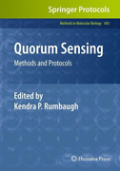
Since its early days in the 1990s, the Quorum Sensing (QS) field has grown from a few dozen laboratories, investigating the pathways, proteins, and chemicals that facilitate signaling in bacteria, to hundreds of groups that have integrated evolutionary biology, computer science, mathematics, engineering, and metagenomics to create an ever-expanding and dynamic field. In Quorum Sensing: Methods and Protocols, expert researchers provide an in-depth set of diverse protocols that span this broad area of study. Broken into three detailed sections, the volume covers the detection, isolation, and characterization of the QSsignals made by both Gram- and Gram+ bacteria, determination of the function of QS signals in vivo, and the development of QS disruption strategies. Written in the highly successful Methods in Molecular Biology™ series format, chapters include brief introductions to their respective topics, lists of the necessary materials and reagents, step-by-step, readily reproducible laboratory protocols, and expert tips on troubleshooting and avoiding known experimental pitfalls. Comprehensive and cutting-edge, Quorum Sensing: Methods and Protocols serves as an invaluable collection of easily accessible techniques for scientists seeking to further our knowledge about bacterial communication and its relation to humanity. Features in-depth protocols on detecting, isolating, characterizing QS signals, function determination, and QS disruption strategies Contributions from expert researchers who have experienced the field from its beginnings to the current cutting-edge studies Includes key notes on avoiding known protocol pitfalls and troubleshooting potential problems INDICE: Bioassays of Quorum Sensing Compounds Using Agrobacterium tumefaciens and Chromobacterium violaceum.- Detection of 2-alkyl-4-quinolones Using Biosensors.- FRET-Based Biosensors for the Detection and Quantification of AI-2 Class of Quorum Sensing Compounds.- Isolation of agr Quorum Sensing Autoinducers.- Liquid Chromatography/Mass Spectrometry (LC/MS) for the Detection and Quantification of N-acyl-L-homoserine Lactones (AHLs) and 4-hydroxy-2-alkylquinolines (HAQs).- Detection of Autoinducer (AI-2) like Activity in Food Samples.- Detection of Bacterial Signaling Molecules in Liquid or Gaseous Environments.-Determination of acyl Homoserine Lactone and Tetramic Acid Concentrations in Biological Samples.- Luminescent Reporters and Their Applications for the Characterization of Signals and Signal-Mimics that Alter LasR-Mediated Quorum Sensing.- Modulation of Mammalian Cell Processes by Bacterial Quorum Sensing Molecules.- Imaging N-Acyl Homoserine Lactone Quorum Sensing In vivo.- Defining theStructure and Function of Acyl-Homoserine Lactone Autoinducers.- Global Expression Analysis of Quorum-Sensing Controlled Genes.- Small RNA Target Genes andRegulatory Connections in the Vibrio cholerae Quorum Sensing System.- Quantifying Pseudomonas aeruginosa Quinolones and Examining Their Interactions with Lipids.- Linking Quorum Sensing Regulation and Biofilm Formation by Candida albicans.- Design of Synthetic Mammalian Quorum-Sensing Systems.- Qualitative andQuantitative Determination of Quorum Sensing Inhibition In vitro.- Custom Synthesis of Autoinducers and Their Analogues.- Heterologous Overexpression, Purification and in Vitro Characterization of AHL Lactonases.- High Performance Liquid Chromatography Analysis of N-Acyl Homoserine Lactone Hydrolysis by Paraoxonases.- Generation of Quorum Quenching Antibodies.
- ISBN: 978-1-60761-970-3
- Editorial: Humana
- Encuadernacion: Cartoné
- Páginas: 310
- Fecha Publicación: 29/10/2010
- Nº Volúmenes: 1
- Idioma: Inglés
